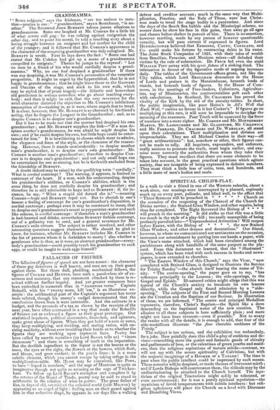GRANDMA MMA
SOME subjects," says the Irishman, " are too serious to men- tion—praties is one : " "grandmothers," says a Scotchman, "is an- other." The Reverend Joust &nom taboos jocose allusions to grandmammas. Some one laughed at Mr. COBDEN for a little bit of what actors call gag : he was talking against emigration the other day, and to point his moral, he told a touching story about a loving struggle between an emigrant and her mother for the child of the younger; and it followed that Mr. COBDEN'S appearance in the character of the mourning grandmother was duly eulogized. Mr. BURNETT is wroth. First he lays down the fact : "Some one had stated that Mr. Cobden had got up a scene of a grandmamma compelled to emigrate." Thence he jumps to the reproof: "Let no man be a friend of his who would cordially despise a grand- mamma." Why, no one had despised a grandmother If there was any despising, it was Mr. COBDEN'S personation of the venerable progenitrix. It might be urged by the hypercritical, that he is not happy in grandmammas ; that he might leave those to the GLovsits and ORGERS of the stage, and stick to his own walk, which may be styled that of prose tragedy—the didactic and benevolent old gentlemen in serious comedies, who go about teaching every- body : and then it might be said, that the very reverence for the avial character dictated the objection to Mr. COBDEN'S infelicitous assumption of it—rushing in, as it were, where angels fear to tread. It is clear, however, that Mr. BURNETT is so charmed by his friend's acting, that he forgets the Leaguer in the Grandmother ; and, so to despise COBDEN is to despise one's grandmother.
But it has to be made out that the scorner had despised his own
grandmother ; and Mr. BURNETT supplies the link—" If a man de- spises another's grandmamrna, he was afraid he might despise his own ; and if he could despise his own, but little hope could be enter- tained for him." It is bewildering to choose which most to admire, the elegance and force of the style, or the closeness of the reason- ing. However, there it stands unmistakeably : to despise another man's grandmother, is to despise one's own grandmother : Mr. COBDEN is another man's grandmother ; therefore to despise COB• DEN IS to despise one's grandmother : and not only small hope can be entertained for one so sinning, but be is forthwith excluded from the friendship of Bussrrr.
A doubt indeed may be raised by the qualifying term "cordially."
What is cordial contempt ? The warning, it appears, is limited to contempt of the heart. If a man, with his understanding, despise Ins grandmother's abilities, or COBDEN'S abilities, which is the same thing, he does not cordially despise his grandmother ; and therefore he is still admissible to hope and to BURNETT: if, for in- stance, he say, "What a stupid old dotard she is ! "—meaning COBDEN—hope and BURNETT repel not. But to cherish in one's bosom a feeling of contempt for one's grandmother's disposition, is cordial contempt ; perhaps even it may be construed to mean, that to despise one's grandmamma's resort to peppermint-water and such like solaces, is cordial contempt : if therefore a man's grandmother is bad-hearted and drinks, nevertheless BURNETT forbids contempt, out of a gallantry run to seed, and a general reverence for Mr. COBDEN'S anile virtues. The subject is rather involved, and other interesting questions suggest themselves. We should be glad to know, for instance, whether Mr. BURNETT includes Mr. COBDEN in the list of persons whom it is forbidden to marry ? also whether a _gentleman who is thus, as it were, an abstract grandmother—every- body's grandmother—could possibly teach his grandmother to suck eggs, or could be taught to suck eggs himself?


















































 Previous page
Previous page